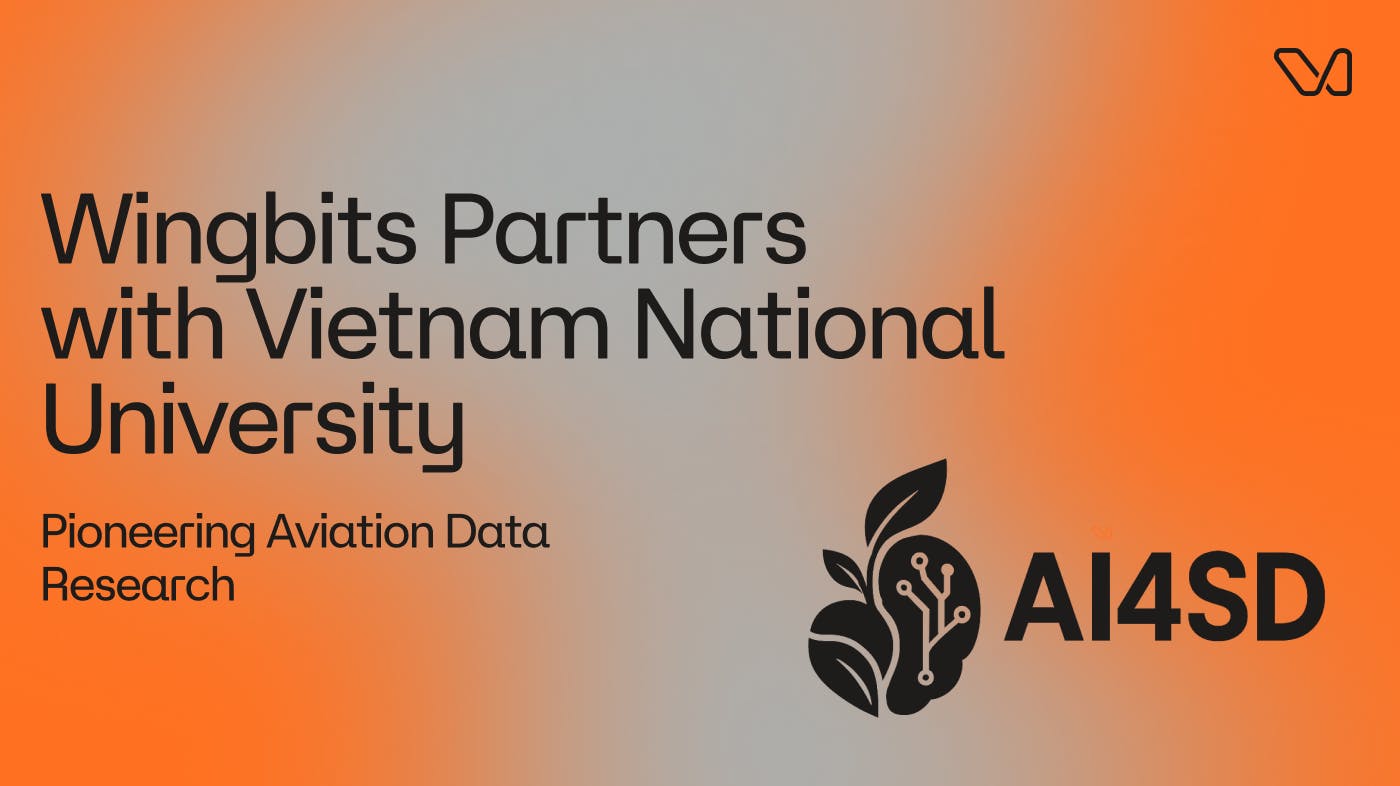Wingbits Partners with Vietnam National University: Pioneering Aviation Data Research
Wingbits
September 15, ‘25

World-class research meets cutting-edge DePIN technology.
Wingbits is proud to partner with Vietnam National University’s Institute for Applied Artificial Intelligence in Sustainable Development (VNU‑AI4SD).
VNU‑AI4SD, under the leadership of its Director, Professor Bui Quang Hung, is Vietnam’s leading institute for AI-driven sustainable development, advancing progress in green economies, climate resilience, smart urban planning and regional resource management.
This partnership merges Wingbits’ real-time ADS‑B flight data with VNU‑AI4SD’s expertise in AI analysis, opening new and exciting opportunities in flight pattern research, autonomous aviation systems, and sustainable infrastructure.
Why Vietnam is a Geographic Stronghold for Flight Data
APAC's aviation sector is surging: In 2024, air traffic in the region grew by 11% compared to 2023 and finished 10% above 2019 levels. Yet, regional monitoring is hampered by fragmented systems: oceans, remote corridors, and high-density corridors remain under-tracked, potentially decreasing safety and operational efficiency.
Vietnam is a key player:
- Tan Son Nhat, in Ho Chi Minh City, serves nearly 40 million passengers annually, ranking among the busiest airports in Southeast Asia.
- Airlines like VietJet Air and Vietnam Airlines operate extensive domestic and international networks, expanding rapidly through new routes and fleet modernization trends.
With booming demand for connectivity and the rapid rise of urban air mobility, Southeast Asia needs dense, reliable flight tracking infrastructure, especially over coastal airspace where coverage remains sparse.

24 hours of Flight Activity over Tan Son Nhat International Airport (SGN), Ho Chi Minh City, Vietnam
Academic Excellence Meets DePIN Innovation
As Southeast Asia emerges as a critical testing ground for next-generation aviation, research-driven infrastructure is essential. Together, Wingbits and VNU-AI4SD are aiming to advance AI-powered insights into autonomous flight, sustainable route optimization, and intelligent infrastructure deployment, creating a feedback loop where academic research directly informs decentralized network growth, and network expansion fuels further academic breakthroughs.
Wingbits is equipping the institute with both the tools and the technical support needed to unlock the full potential of its data - from deploying a complimentary ADS-B receiver at their research center, to granting access to live and historical flight data for advanced analysis.
VNU-AI4SD brings deep academic expertise, strong connections to government and industry stakeholders, and the involvement of students and faculty in hands-on DePIN research. This powerful combination of local insight and regional network will play a vital role in expanding flight tracking coverage across Southeast Asia while driving research that directly addresses real-world aviation challenges and shapes the future of the industry.
In the course of this partnership, the department will be working with the Vietnam Aviation Administration to deploy additional stations and conduct data analysis.
Real-Time Research for Real-World Impact
Beyond traditional academic studies, this partnership could enable new directions in applied research, such as:
- Eco-conscious flight routing: modeling and optimizing trajectories to minimize emissions and fuel use.
- AI-powered traffic insights: analyzing flight patterns in real time to anticipate delays and reroute with minimal disruption.
- Intelligent infrastructure deployment: using flight data to guide where to place new tracking nodes for maximum coverage and resilience.
These applied studies have the potential to shape the future of aviation traffic management in Asia - driving the development of systems that are adaptive, scalable and responsive in real time.
The Way Forward
By meshing decentralized physical infrastructure networks with academic research, we're building the foundation for infrastructure that’s not just resilient and autonomous, but scientifically validated. This partnership exemplifies how university and private industries can co-create solutions to real-world challenges.
If you're an academic researcher, a university leader, or a policy maker focused on aviation, AI, or sustainable infrastructure, let's explore how we can collaborate and expand this network together.

Company
Wingbits is a DePIN (Decentralized Physical Infrastructure Network) that rewards community members with $WINGS tokens for monitoring aircraft in real-time using specialized ADS-B hardware. The network aligns incentives to compensate participants based on the quality and quantity of flight tracking data they contribute, creating a more equitable alternative to traditional tracking systems. By incentivizing strategic hardware placement and reliable uptime, Wingbits is building the world's largest and most secure flight tracking network while disrupting an industry that has relied on unpaid volunteers for decades.